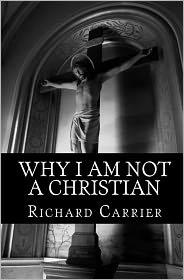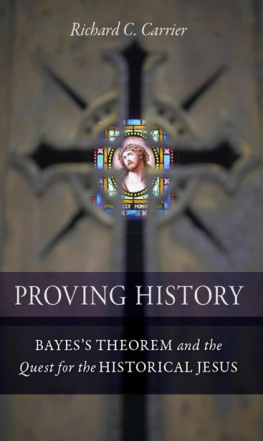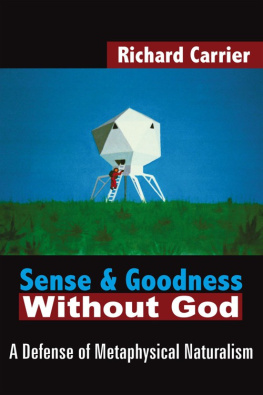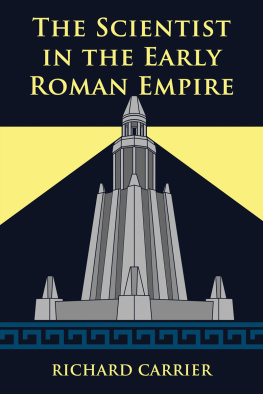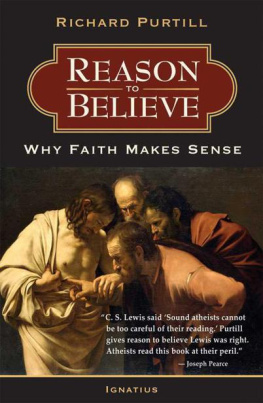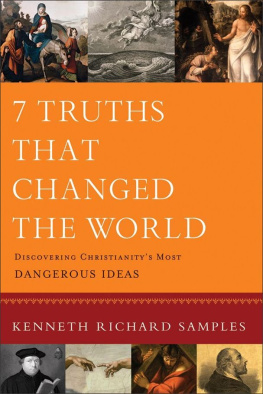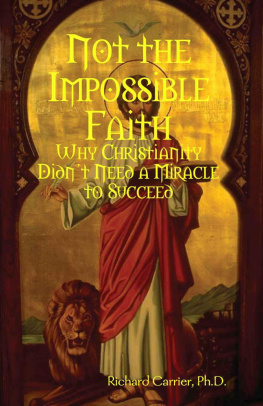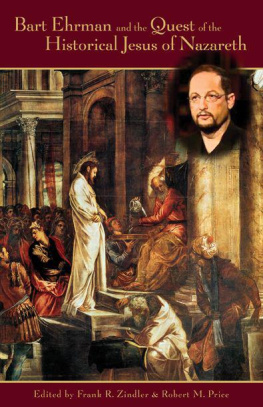Why I Am
Not a Christian
Four Conclusive Reasons
to Reject the Faith
by
Richard Carrier, Ph.D.
To truth, reason,
and common sense.
Why I Am Not a Christian:
Four Conclusive Reasons to Reject the Faith
Copyright 2011 by Richard Carrier, Ph.D.
All Rights Reserved
Published by Philosophy Press
(Richmond, California)
www.richardcarrier.info
ISBN (of softcover edition):
978-1456588854
Contents
Why This Book
God is Silent
God is Inert
Wrong Evidence
Wrong Universe
Conclusion
Why This Book
Im cognitively defective. Or thats what Christians tell me. Its not true, of course. But the curious thing is how desperately they need to believe there is something wrong with me. For otherwise, they cannot explain how someone so well informed about their religion could reject their faithindeed, someone who doesnt just give it a pass, but rejects it as firmly as any other bizarre cult or superstition. Which is what it is. This book is about why.
Once upon a time, a generous fellow by the name of John Ransom hired me to write out my reasons for rejecting the Christian religion. The result was an online essay, of which this is an updated edition in print. Why a print edition? Because yet another generous fellow wanted there to be one. So he arranged for this book to be published. Its just too important, too well put, not to have it in a handy carry-about form, he said. In this way we can take it with us, store it on our shelves (or in our kindles), read it while all cozy on our couches or lawns, write notes in the margins, hand copies out to other people willing to read it. Besides, he said, Christian fundamentalists need something to burn at the next Nuremburg rally.
Why me? Well, Ive become something of a world renowned atheist, noted for my work in both history and philosophy, particularly in my criticism of the dubious and often delusional claims of various Christians. Just google my name and youll see what I mean. Given my close study of the issues and my renown for cutting straight to the heart of them, I should summarize my case, John said, simply and clearly so everyone can understand where I'm coming from. He was especially frustrated by Christians who routinely come up with implausible excuses to defend their faith, which they dont really examineas if defending their faith with any excuse mattered more than having a genuinely good reason to believe in the first place.
Discussing our experiences, we realized wed both encountered many Christians like this, who color their entire perception of reality with the assumption that they have to be right, and therefore the evidence must somehow fit. So they think they can make anything up on the spur of the moment and be sure its true. This is the exact opposite of what we do. We start with the evidence, and then figure out what the best explanation of it all really is, regardless of where this quest for truth takes us. John and I also shared the same experiences in another respect: when their dogmatism meets our empiricism, slander is not far behind. I have increasingly encountered Christians who accuse me to my face of being a liar, of being wicked, of not wanting to talk to God, of willfully ignoring evidence, of being cognitively defectivebecause that is the only way they can explain my existence. I cannot be an honest, well-informed pursuer of the truth who came to a fair and reasonable decision after a thorough examination of the evidence, because no such person can exist in the Christian worldview, who does not come to Christ. Therefore, I must be a wicked liar, I must be so deluded by sin that I am all but clinically insane, an irrational madman suffering some evil demonic psychosis.
There is nothing I can do for such people. Nothing I ever show or say to them will ever convince them otherwiseit cant , because they start with the assumption that their belief in Christ has to be true, therefore right from the start everything I say or do is always going to be a lie or the product of some delusion. They dont need any evidence of this, because to their thinking it must be the case. Such people are trapped in their own hall of mirrors, and for them there is no escape. They can never know whether they are wrong, even when they are. No evidence, no logic, no reason will ever get through to them.
When we combine this troubling fact with the observation that their religion, like every other, appears tailor-made to justify their own culture-bound desires and personal vanitiesas if every God is made in mans image, not the other way aroundthen we already have grounds for suspicion. The fact that the Christian idea of God has constantly changed to suit our cultural and historical circumstances, and is often constructed to be impervious to logic or doubt, is reason enough to step back and ask ourselves whether were on the wrong track with the Christian worldview. And the fact that Christianity is identical in all these respects to other religionslike Hinduism or Islam, which every Christian must agree are false faiths yet are nevertheless just as firmly believed, on essentially the same force of evidence, and defended with essentially the same excusesshould finally shake anyone out of their complacency and compel them to ask whether they, too, are as blind as all those other people with false religions. But anyone who is not thus shaken will be incapable of ever knowing who is wrong...is it those people, or themselves?
This essay will never convince Christians who have locked themselves inside a box of blind faith like this. But for other Christians out there who actually have an open mind, a good summary of my reasons for rejecting Christianity will help show why I am not a deluded liar, but in fact an honest and reasonable man coming to an honest and reasonable decision. What follows is not meant to be a thorough exploration of every nuance and problem, nor an exhaustive account of all the arguments and evidence. Rather, its a mere summary of the four most important reasons I am not a Christian. This is only the beginning of the story, not the whole of it. Thats what my benefactor asked for: a simple but well-written explanation of why I am not a Christian.
If you need more, if you want to see how I got here from close and extensive study of the relevant facts, both historical and philosophical, then I have a large body of work out there for you to explore. Start with my books Sense and Goodness without God (2005) and Not the Impossible Faith (2009), and my chapters in John Loftus book The End of Christianity (2011). My work on the historical evidence of Jesus resurrection appears in Loftus earlier book The Christian Delusion (2010) and Lowder & Prices book The Empty Tomb: Jesus Beyond the Grave (2005). More can be found through my website: richardcarrier.info .
For the present book I shall assume that C.S. Lewis was correct when he said mere Christianity consisted in the belief that there is one God who is quite definitely good or righteous, who takes sides, who loves love and hates hatred, who wants us to behave in one way and not in another, and who invented and made the universe. But this God also thinks that a great many things have gone wrong with the world and thus insists, and insists very loudly, on our putting them right again, and to this end he arranged the death and resurrection of His only Son, Jesus Christ, who is (or embodies or represents) the Creator, and can alone save us from eternal death if we now ask this Jesus to forgive our sins. Thats as quoted and paraphrased from his aptly titled (and very popular) tract Mere Christianity .
If this is what Christianity is (and most Christians appear to believe so), then there are four reasons why I do not believe a word of it. And all four would have to be answered with a clear preponderance of evidence before I would ever change my mind. Im serious about this, too. If all four points are ever refuted with solid, objective evidence, then any other quibbles I have beyond these four would not stop me from declaring faith in Christ. For surely any other problem I or anyone might find with the Christian worldview could easily be solved from within the faith itselfif it werent for the following four facts. So to those we now turn.
Next page
